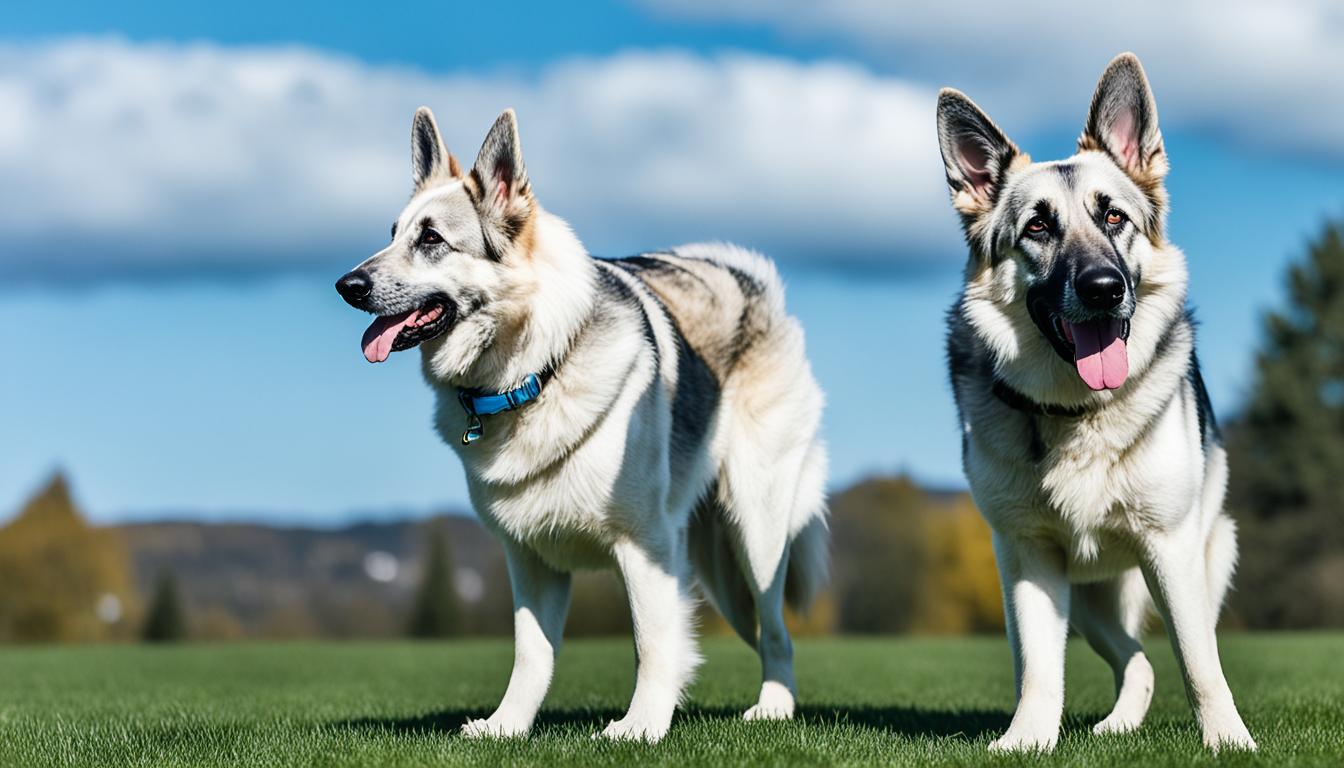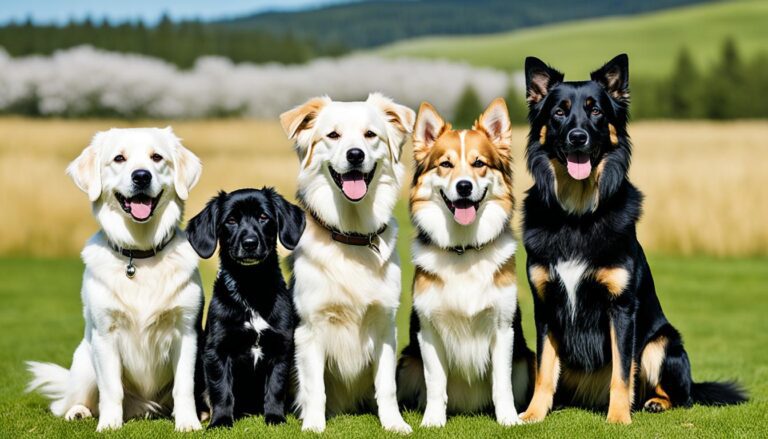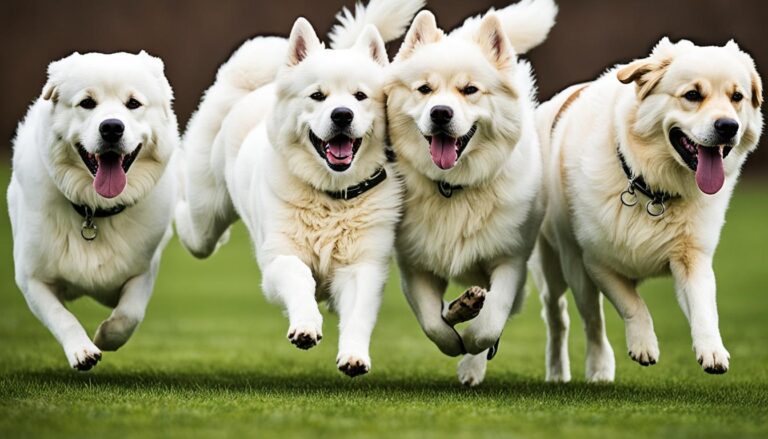German Shepherd White and Grey – Breed Guide
Did you know that German Shepherd Dogs come in a stunning array of 15 different color variations? While most people are familiar with the classic black and tan German Shepherd, there are also variations like white and grey that can capture your heart.
These unique color variations add a touch of individuality to this already remarkable breed. In this article, we will explore the different colors of German Shepherds, focusing on the beautiful white and grey variations.
Whether you’re considering adding a German Shepherd to your family or simply appreciate the breed’s diversity, this guide will provide you with valuable insights into the world of German Shepherd colors.
The Color Variations of German Shepherds
German Shepherds are renowned for their intelligence, loyalty, and striking appearance. While the classic black and tan coloration is most commonly associated with this breed, German Shepherds actually come in a variety of colors. In this section, we will explore the fascinating color variations of German Shepherds, including white, grey, and the timeless black and tan.
White German Shepherds
One of the most eye-catching color variations of the German Shepherd breed is the white coat. With their glistening pure white fur and regal stature, white German Shepherds exude elegance and grace. This color variation is achieved through specific breeding practices and is characterized by a lack of pigmentation. While the coat color may differ, their character and working ability remain true to the German Shepherd breed.
Grey German Shepherds
Grey German Shepherds possess a distinctive wolf-like appearance with their dark coats. This color variation adds an air of mystery and uniqueness to the breed. The shades of grey can range from light ash to deep charcoal, creating a striking contrast to their piercing eyes. Like their black and tan counterparts, grey German Shepherds are known for their intelligence, loyalty, and versatility.
Black and Tan German Shepherds
Without a doubt, the black and tan color combination is the most iconic and traditional appearance for German Shepherds. These dogs have a jet black body with rich tan markings on their face, chest, and legs. The black and tan German Shepherds are highly recognizable and exemplify the breed’s classic charm. They are not only aesthetically appealing but also possess the renowned German Shepherd traits of loyalty, courage, and impressive working abilities.

While the color variations of German Shepherds undoubtedly contribute to their visual appeal, it’s crucial to remember that color alone should not be the primary factor when choosing a German Shepherd. The breed’s character, temperament, and health should take precedence over coat color. Whether you prefer the elegance of a white German Shepherd, the distinctive look of a grey German Shepherd, or the timeless charm of a black and tan German Shepherd, each color variation offers its own unique beauty and qualities. Focus on finding a reputable breeder who prioritizes the breed’s overall health and temperament, ensuring you bring home a loyal and well-rounded companion.
Rare Color Variations: Isabella and Liver German Shepherds
When it comes to German Shepherds, we often think of the classic black and tan color combination. However, did you know that there are rare color variations within this breed? In this section, we will explore two unique color variations: Isabella and Liver German Shepherds.
Isabella German Shepherds
Isabella German Shepherds have a truly distinctive coat color that is a result of combining the liver and blue dilution genes. This combination creates a stunning light brown coat that stands out among other German Shepherds. In addition to their unique coat color, Isabella German Shepherds also have noses that can be different shades, further enhancing their individuality.
Liver German Shepherds
Liver German Shepherds, also known as Red German Shepherds, have a rich reddish-brown coat that sets them apart from other color variations. Their coat color is deep and lustrous, giving them a regal appearance. Another distinguishing feature of Liver German Shepherds is their beautiful amber-colored eyes, adding to their overall charm and allure.
It is important to note that these rare color variations can add a touch of uniqueness and beauty to the breed. However, breeders must exercise caution when selectively breeding for these recessive traits. Focusing too heavily on rare color variations can limit the gene pool and increase the risk of genetic conditions.
German Shepherds are known for their intelligence, loyalty, and versatility, regardless of their coat color. It is essential to consider the temperament, health, and overall qualities of the dog when selecting a German Shepherd, whether it’s an Isabella, Liver, or another color variation. Breeders and owners alike should prioritize the well-being of these incredible dogs by carefully considering the genetics and characteristics of the breed.
Conclusion
German Shepherds are a versatile and highly trainable breed. When choosing a German Shepherd puppy, it is essential to prioritize the overall temperament and health of the dog. While the color variations, such as white and grey or black and tan, may be visually appealing, these qualities should not be the sole determining factors in selecting a puppy.
Researching reputable breeders is crucial in ensuring the well-being and quality of your German Shepherd. Reputable breeders can provide valuable information on the breed’s temperament, exercise requirements, and potential health issues to consider. By obtaining a puppy from a trustworthy source, you increase the likelihood of welcoming a healthy and well-adjusted companion into your home.
German Shepherds, regardless of their color variation, possess traits that make them exceptional companions and working dogs. Their intelligence, loyalty, and versatility make them suitable for various roles, including search and rescue, police work, and service dogs. However, it is important to remember that these traits can only shine through with proper care, training, and socialization.
In conclusion, when considering German Shepherd puppies, look beyond their color and focus on the breed information, temperament, and care requirements. These factors will play a significant role in ensuring a harmonious and fulfilling relationship with your German Shepherd throughout their life.
FAQ
Are white and grey German Shepherds common color variations?
White and grey German Shepherds are less common compared to the classic black and tan color combination. However, they are recognized and can be found among the various color variations in the breed.
What are the other color variations of German Shepherds?
German Shepherds come in a variety of colors, including black and tan, pure black, white, liver, blue, and even rare colors like Isabella and grey. The coat colors can range from solid to patterned, giving each variation a unique appearance.
What are Isabella and liver German Shepherds?
Isabella German Shepherds have a unique coat color that combines the liver and blue dilution genes, resulting in a striking light brown coat. Liver German Shepherds, on the other hand, have a rich reddish-brown coat. These color variations add uniqueness to the breed, but caution should be exercised when breeding for recessive traits.
How important is color when choosing a German Shepherd puppy?
While color may be visually appealing, it should not be the primary factor in choosing a German Shepherd puppy. It’s more important to focus on the overall temperament, health, and working ability of the dog. Proper research, considering the breed’s characteristics, and obtaining a puppy from a reputable breeder are key factors in making a well-informed decision.







